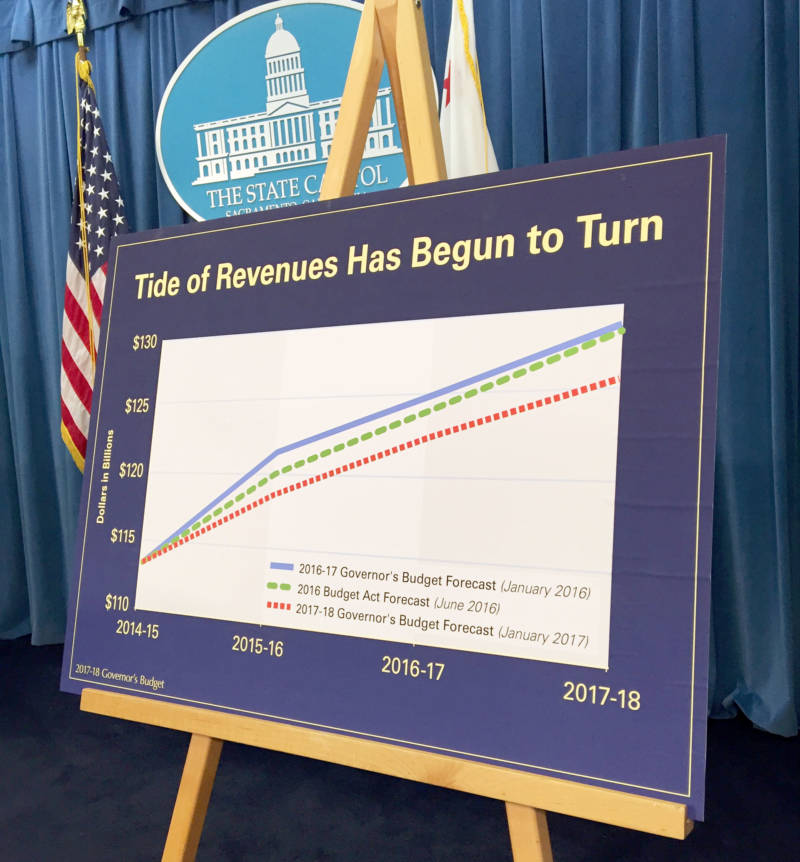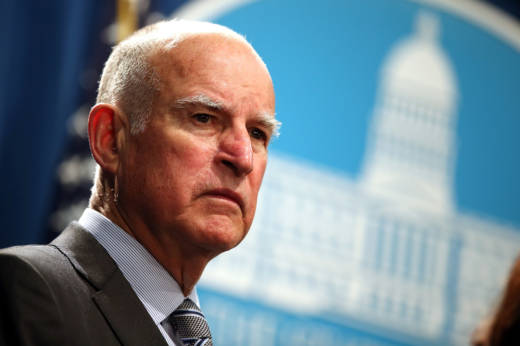Brown also wants to halt $300 million in spending on modernizing state office buildings. And, the governor said he will keep spending flat by pausing rate increases for child care and not allowing any new students to qualify for a higher education scholarship fund.
But the governor said he will protect what he called the Capitol's "most important achievements" under his watch -- education spending increases, an earned income tax credit for the working poor, a rising minimum wage and adding millions of Californians to the rolls of the insured. And he said he will again propose a transportation package that would add $43 billion over 10 years to help shore up roads, highways and bridges. It would be funded through new vehicle fees, an increase in the gas tax and an increase to the diesel excise tax.
On climate change -- one of Brown's signature issues -- the governor said he wants lawmakers to take up the state's cap-and-trade system and approve it by a two-thirds vote. The program has been in court after legal challenges that in part center around the fact that a majority, not a supermajority, of the Legislature authorized the program. Brown said that uncertainty is impacting its financial success.
"It's a very important program that's part of our climate change strategy," he said, noting that with people hostile to climate change policies taking over the federal government, "the whole world is looking to us. ... We ought to continue."
He said he is making no assumptions about what Congress and President-elect Trump will do -- particularly around health care -- but that he's not budgeting based on things that haven't yet occurred.
"There are too many uncertainties that could put a massive hole in the budget," he said. "This budget can move very quickly -- what I call riding the tide."
That could go the other way, he said -- revenues could increase in coming months.
The state's financial volatility, Brown said, is largely because of what the governor called the state's "progressive" tax structure that relies on capital gains taxes from its wealthiest residents.
"California has the most progressive tax system in the U.S. -- but as a a corollary, we have one of the most unreliable revenue systems in the country and to manage it reliably requires prudence."
Brown said that's why he's pushed the state to save money in good years.
"If you want a progressive tax system, you need a big rainy day fund," he said.
Republicans had a mixed reaction to Brown's budget proposal. Senate Minority Leader Jean Fuller (R-Bakersfield) said more money should be going to the state's reserve funds and toward paying down the state's pension liabilities.
"But we agree with the governor that a spending decrease solution is far better than a tax increase solution at this time," she said.
Assemblyman Jay Obernolte, R-Hesperia, rejected the governor's plan to increase gas taxes to fund road and highway repairs. Legislative Democrats have made similar proposals.
"We are already paying the highest gas taxes in the country," Obernolte said. "And there are large sections of revenue that we can return to funding state road and highway construction that are not being so spent right now."
While Democratic lawmakers generally commended Brown's cautious approach, they pushed back on the lack of funding in some areas. Assembly Speaker Anthony Rendon (D- Los Angeles) criticized Brown's plan to phase out the Middle Class Scholarship Program.
"We must work to keep college affordable for California students, and I will not support burdening them with higher fees and greater student debt — whether that's done by raising tuition or phasing out the Middle Class Scholarship," Rendon said in a statement. "Ending the Middle Class Scholarship would increase the cost of a student’s four year education by up to $9,000 at CSU and up to $20,000 at UC."
The lack of new funding for affordable housing concerned Assemblyman David Chiu, D-San Francisco, who chairs the Assembly housing committee.

